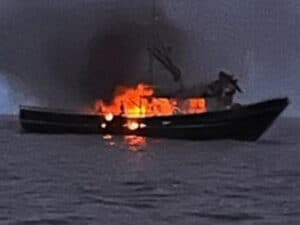
EU to provide funds for LNG refueling study
Written by The European Union (EU) will provide EURO 9.57 million towards a study to examine the feasibility of developing LNG refueling infrastructure for ships in Northern Europe. The grant will also fund a pilot project to modify the design of two newbuild vessels to accommodate LNG propulsion. The total cost of the project is EURO 26.8 million.
The European Union (EU) will provide EURO 9.57 million towards a study to examine the feasibility of developing LNG refueling infrastructure for ships in Northern Europe. The grant will also fund a pilot project to modify the design of two newbuild vessels to accommodate LNG propulsion. The total cost of the project is EURO 26.8 million.
The study supports the EU’s efforts to develop the Motorways of the Sea concept, which is aimed at creating a new maritime-based transport system to shift freight from congested European roads to the water. The Motorways of the Sea concept focuses on the Baltic Sea, North Sea and the English Channel. A similar effort in the U.S., called Marine Highways, has been hampered by politics, lack of financing and regulation.
to the water. The Motorways of the Sea concept focuses on the Baltic Sea, North Sea and the English Channel. A similar effort in the U.S., called Marine Highways, has been hampered by politics, lack of financing and regulation.
The pilot project will focus on a very large LNG-fueled ROPAX vessel, with 1,350 lane meters for trucks. Tests will then be carried out on the vessel to validate its environmental and climate benefits. Burning LNG as fuel eliminates SOx and cuts 85 to 90% of NOx than bunker fuels and reduces CO2 emissions by 25%.
The Baltic Sea and parts of the North Sea are already Emissions Control Areas, making them particularly well suited for using LNG as fuel. Ship operators must already burn more expensive ultra-low sulfur fuel or use exhaust gas scrubbers in these ECAs. The EU has already introduced 0.1 percent sulfur as a maximum level for a ship’s fuel when in ports and on inland waterways. As of July 1, 2010, the maximum level of sulfur in fuel is set at 1 percent within SOx Emission Control Areas, and the requirements will be further tightened to 0.1 percent by 2015 Under the requirements of the revised Annex VI of MARPOL 73/78 adopted by The International Maritime Organization (IMO).
Norway has taken the lead in using LNG as fuel in its coastal market. Back in 2000, the DNV-classed car-passenger ferry Glutra was the first to use LNG as fuel. The 1,651-gt ferry has been in operation since February 2000, crossing a fjord close to the city of Molde at the west cost of Norway.
If successful, the pilot project could have larger implications for other geographical areas within the EU. One result could be the implementation of LNG in similar vessels throughout Europe on short international routes, as well as for domestic traffic.
July 20, 2011





Leave a Reply
You must be logged in to post a comment.